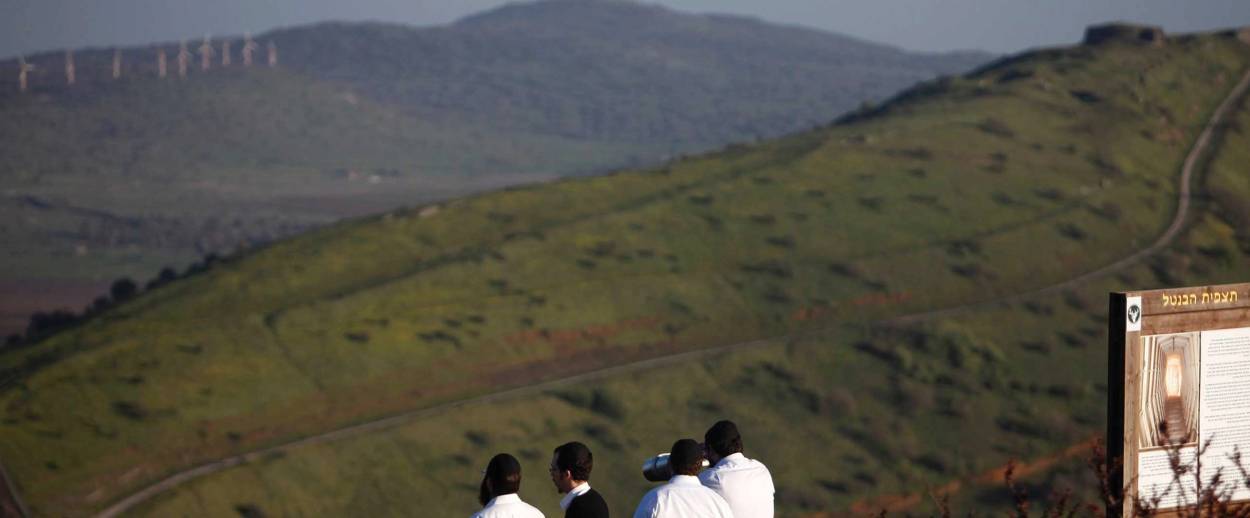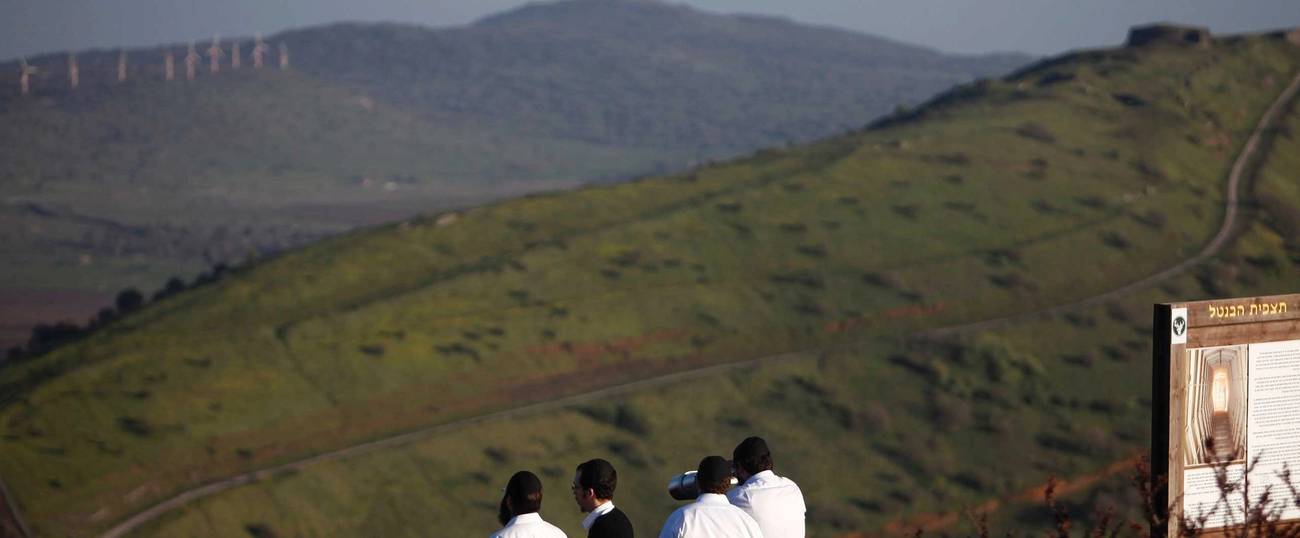In the Heights
What I found on a weekend trip to the Golan




If you tell Americans you’re going to the Golan Heights, they think you’re taking your life into your hands. It doesn’t matter if you say that inside Israel it’s been quiet for more than 40 years. They’re set on the idea. The place only gets mentioned alongside worrisome words like “annexation,” “international recognition,” “UN troops,” and formulations about “land for peace,” a quaint phrase that dates to the period before the greater region fell to pieces like a Byzantine mosaic.
The manner in which I almost did fall prey to harm, on a visit to the Golan two years ago, better illustrates the reality.
It was 1 o’clock in the afternoon on Shabbat. I arrived at a kibbutz guesthouse to learn that I’d needed to bring my own food. All I’d had to eat was an egg early in the morning. It hadn’t occurred to me that nothing would be open. No food? No problem. They would serve breakfast in the morning. Morning? From 8 a.m. That was, uh, still 19 hours from now.
“Wait a minute,” I said. “There’s no food? Nothing?”
“We don’t offer food on Shabbat,” the woman holding down reception told me, “out of respect for the religious.”
“I’m pretty sure the religious rest on Shabbat,” I told her. “I wasn’t aware that they also fast.”
“I’m not religious,” she said. I handed her back the keys.
I got in the car, only to face another issue: a near-empty gas tank. (My wife is always on me about not filling up until it’s an emergency, and I’m sincere when I promise to listen to her next time.) I took a wrong turn. Given how few roads are in the Golan, it’s actually a hard mistake to make. I drove along some bands of asphalt alongside the Jordanian border and eventually past vineyards, groves, ranches, ruins, and memorials to soldiers who died retaking the land in 1973 after the Syrian army rolled in to retake the land it lost in 1967.
Near Katsrin I found a gas station, and bought a bag of Bisli. Original flavor. I have no idea what that flavor actually is, and I think I like it because it transports me to my days as a 20-year-old volunteer on Kibbutz Haogen.
At 2:30 I pulled into Merom Golan, another kibbutz with a guesthouse. They had one room left but check-in on Shabbat was 6. I asked about food.
“You’re in luck,” the receptionist said. “Our restaurant is open.”
“Oh, thank God for good luck!”
“They open at 7:30.”
“7:30? Until when?”
“To be honest, not for that long. Until people aren’t ordering. We don’t have many people.”
“But you told me you’re booked solid.”
“We have a bus group arriving. They will start at 7 o’clock, and when they’re done the restaurant will close.”
“They’ll start at 7 and the restaurant opens at 7:30?”
“Yes.”
“And it’ll close—”
“Around then, to be honest.”
“So for me, it’ll open at 7:30 and close at about 7:30?”
“I’m afraid so.”
It was a good place to stay, so I checked in, but I still had to find a solution for my hunger—I couldn’t wait five more hours to eat. It dawned on me that I could get a good lunch in a Druse village. No Shabbat there! When I started out in the morning, traveling alone from Tel Aviv, I hadn’t planned to drive halfway to Damascus, but I was almost there at this point, anyway. I scarfed down the rest of the bag of Bisli. Between that and the Danny Robas song on the radio, I passed a few amiable moments revisiting the late 1980s and was probably driving at a speed to match my ferocious appetite, when suddenly I had to brake on the nostalgia to avoid crashing into eternity. A man on a horse, in a 10-gallon hat and cowboy boots, like he’d just galloped in from Wyoming, crossed in front of me. If he’d really been from Wyoming, he would have tipped his hat.
But he wasn’t. He was an Israeli. So he just carried on, and I continued on for lunch in Ma’asedeh.
***
The next day I met up with my friend Israel Eshed. We met a couple of years ago when I signed up for the first Golan Ultra Marathon, which got curtailed to 10 kilometers from 100 due to heavy rain. We went hiking on the Golan Trail, which he created. Israel is a lovely guy, a really fine spirit. He was born in Poland in 1955, the child of Holocaust survivors. He enlisted in the army just in time for the Yom Kippur War, then settled in the Golan and helped found Eliad, a moshav named for Eli Cohen, the Israeli spy killed in Syria in 1965. He and his wife, Orna, a highly respected biologist at the Technion, built a house surrounded by grapefruit and orange trees, and raised horses. They also raised three children. Life was good, and things flourished for them as it did for the Golan generally, until 1995, when Orna fought her first war with cancer. Ten years later it re-invaded their happiness again, and this time she did not survive. That’s when Israel started whacking the Golan Trail, a two-year endeavor, to find his way through the high grass and thorns of grief. When he was done, the 120-kilometer route ran from Mount Hermon to the southern edge of the Kinneret.
Now, he looks like a man who used to be lean and athletic until he discovered gustatory delights, and it was a lot of work and not enough fun at this stage of the game to stay lean. But he’s still active. When we met he wore a faded shirt that said, “This body climbed Mt. Washington.” It also climbed, among others, Mount Rainier and Mount Blanc, and traversed the Grand Canyon three times. I mentioned my friend Lior in Tel Aviv, the editor of some Israeli magazine, who planned to climb Rainier without training.
“Typical Israeli,” Israel said.
We wanted to go hiking again, so I followed him in my rented Hyundai to leave a car in the spot where we’d eventually finish, and then we drove to where we’d start, and set off.
Wildflowers filled in spaces between olive trees and cactuses and burning bushes of wild mustard. Sunlight glazed the surface of the Kinneret, the Sea of Galilee, its fame so disproportionate to its size. In America, we’d call it a lake, somewhat like the Jordan River, which we’d call a stream.
We came to a ruin, a half-collapsed rectangle of a building from the 1880s. It had been the center for a group of families from Safed. (The explanation was in Hebrew on both sides. It was supposed to be Hebrew on one side and English on the other, but the printer duplicated the same Hebrew text on both sides. Typical Israeli.) They settled by a spring and in due course, many of them died from sicknesses, because, if you think about it, what else could possibly happen in an isolated place with frosty winters and malarial summers and no medicine. Back then, you toughed it out or you died. In 1920, during one of the Arab-Jewish flare-ups, the ones who toughed it out, all but a mother and son whose last name was Bernstein, were murdered.
“Can you imagine living here?” I said. “I bet they didn’t even have WiFi.”
We gingerly negotiated our way back down a slope to avoid a sticky weed shaped like spearmint that pricked and burned. The tough bastards who once lived here, and the Arabs who came after that, probably just walked on it and didn’t even notice.
***
At Eliad, Israel’s friend Alon had a big house with a crazy long and beautiful dinner table made from two single planks of a eucalyptus tree. Alon was on his way to help a couple new to the community build their house. They had given all their money to a contractor to build it, and the contractor, a Jewish thief, absconded. Now the members of Eliad were donating their labor to build the house. And they had gotten outside help, too. Six people from the old German Democratic Republic had shown up to work, too. They were working for free, very hard, dusk to dawn.
“How did they know the story?”
“They are—how do you say it?—messianic Jews, and they love Israel. They heard what happened and they came to help. There was a group before them. They’re halfway between Jews and Christians. Wonderful people!”
Not-such-wonderful people were terrorizing and killing one another a short distance away. That’s the border with Syria. The last time there was an actual war here was 1973. Eliad set up a field hospital, where wounded Syrian soldiers were treated. One of them managed to communicate coordinates to his comrades and the field hospital was mortared. A memorial marks the spot where doctors, nurses, and medics were killed. It had been quiet since then, but at the time of my visit, Al-Nusra, an Al Qaeda affiliate that broke away to form its own group, moved in, and ISIS was also busy hunting for real estate.
We sat outside Chateau Golan, the boutique winery on the edge of Eliad, and sipped wine.
“Can you hear fighting?” I asked Itzhak Ribak, the winery’s owner.
“At one time we heard a lot. But not lately.”
“Does it make you nervous?”
“No. Right now they’re fighting each other. We wish both sides much success!”
For the moment, that conflict could have been on Jupiter. We were about to enter another. Or not. Israel said he liked French reds. The winemaker, Uri Chetz, who learned his craft during six years in Oregon after a career as an IDF pilot, asked which he liked best. Israel said, “Chablis.”
“There are no reds in Chablis,” Uri said, smirking. “That’s why I asked you, to see if you knew.”
“They make reds in Chablis,” Israel insisted.
“No, they don’t. They don’t even grow grapes for red.”
In America, correcting someone so forwardly would be considered a symptom of what psychologists call an impulse-control problem. An American would say, “I didn’t know they grew reds in Chablis! I thought they only grew Chardonnay grapes and made very dry white wines …” and then through an accretion of detail the American would demonstrate that the person was mistaken, if not a complete ignoramus. An Israeli uses words and tone and is as subtle as a grenade followed by a finishing spray of an M-1. Wow, what a goddamn moron you must be, reds in Chablis! Holy mackerel, and I’m sitting here talking to you yet.
We all get to the same place, just on different routes.
But here was another difference between us. It’s that the American, having been impolitely corrected, would feel foolish and bitter, while the Israeli, having just had his front teeth knocked in, just shrugged and knocked back another glass of wine. There was a war on down the road waged by genocidal fanatics, and another one, no doubt, coming in a few years to a theater near here, and right now the sun was shining and it was a beautiful afternoon sipping a beautiful wine, so who really gave a toss what they grew in Chablis?
***
Like this article? Sign up for our Daily Digest to get Tablet Magazine’s new content in your inbox each morning.
Todd Pitock is a writer in Philadelphia.